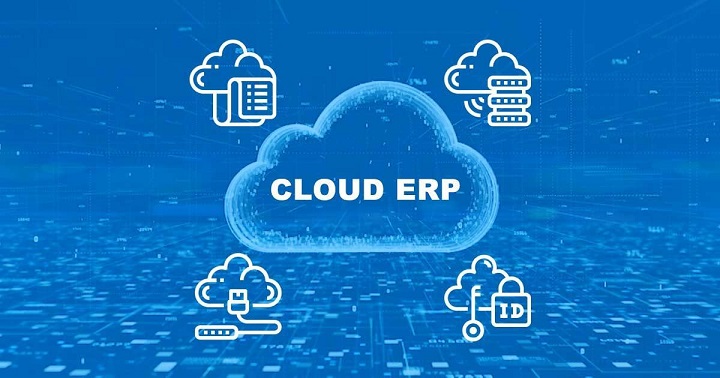In today’s fast-paced business landscape, companies need to stay ahead of the curve to remain competitive. One way to achieve this is by adopting a cloud-based enterprise resource planning system.
A cloud erp solution allows businesses to streamline their operations, reduce costs, and enhance efficiency. By leveraging the power of the cloud, organizations can access their ERP system from anywhere, at any time, and on any device.

With a cloud erp, businesses can automate processes, improve collaboration, and make data-driven decisions. This can lead to increased productivity, reduced errors, and improved customer satisfaction. By adopting a cloud erp, companies can stay ahead of the competition and achieve their goals more effectively.
Understanding Cloud ERP Systems
Cloud ERP systems have emerged as a vital tool for modern businesses, offering a more efficient, flexible, and scalable alternative to traditional ERP systems. As companies continue to navigate the complexities of the digital age, understanding the nuances of Cloud ERP is crucial for making informed decisions about operational infrastructure.
What is Cloud ERP?
Cloud ERP refers to enterprise resource planning software that is hosted in the cloud, allowing businesses to manage their operations remotely through internet-connected devices. This setup eliminates the need for on-premise hardware and reduces the burden on IT teams, as the cloud provider manages updates, security, and maintenance.
Key characteristics of Cloud ERP include:
- Scalability to adapt to changing business needs
- Accessibility from any device with an internet connection
- Automatic software updates and maintenance by the provider
Traditional ERP vs. Cloud ERP
The primary difference between traditional ERP and Cloud ERP lies in their deployment models. Traditional ERP requires significant upfront investment in hardware and software, as well as ongoing maintenance costs. In contrast, Cloud ERP operates on a subscription-based model, reducing initial costs and shifting maintenance responsibilities to the cloud provider.
| Feature | Traditional ERP | Cloud ERP |
|---|---|---|
| Deployment | On-premise | Cloud-hosted |
| Initial Cost | High | Low |
| Maintenance | In-house | Provider-managed |
The Evolution of Enterprise Resource Planning
ERP systems have evolved significantly over the years, from simple inventory management tools to comprehensive platforms that integrate various business functions. The advent of cloud technology has further accelerated this evolution, enabling greater flexibility, scalability, and collaboration.
Benefits of Cloud ERP for Modern Businesses
Cloud ERP offers a multitude of benefits that can transform the way businesses operate, making them more agile and competitive. By adopting a Cloud ERP system, businesses can experience significant improvements in various aspects of their operations.
Cost Efficiency and Reduced IT Overhead
One of the primary advantages of Cloud ERP is its ability to reduce IT overhead costs. By moving to the cloud, businesses can eliminate the need for expensive hardware and reduce the costs associated with maintaining and updating their ERP systems. According to a recent study, companies that implement Cloud ERP can save up to 30% on IT costs.
Key cost savings include:
- Reduced hardware and infrastructure costs
- Lower maintenance and support costs
- Decreased energy consumption and cooling costs
Enhanced Accessibility and Remote Work Support
Cloud ERP systems provide enhanced accessibility, allowing employees to access critical business data from anywhere, at any time. This is particularly beneficial for businesses with remote workers or multiple locations. As noted by Gartner, “Cloud ERP enables organizations to support remote workforces more effectively, improving productivity and collaboration.”
Scalability and Flexibility
Cloud ERP solutions are highly scalable, allowing businesses to easily adapt to changing market conditions and growth. As businesses expand or contract, their ERP system can scale accordingly, without the need for significant investments in new hardware or software.

Automatic Updates and Maintenance
Cloud ERP providers handle updates and maintenance, ensuring that the system is always up-to-date and secure. This not only reduces the burden on IT staff but also ensures that businesses are always benefiting from the latest features and security patches.
“The cloud ERP model ensures that our system is always current and secure, allowing us to focus on our core business.” –
Improved Security and Disaster Recovery
Cloud ERP systems offer advanced security features and disaster recovery capabilities, providing businesses with peace of mind and protection against data loss. Cloud ERP providers typically have robust security measures in place, including data encryption, firewalls, and access controls.
| Security Feature | Description | Benefit |
|---|---|---|
| Data Encryption | Protects data both in transit and at rest | Ensures confidentiality and integrity of data |
| Firewalls | Controls incoming and outgoing network traffic | Prevents unauthorized access to data |
| Access Controls | Limits user access to sensitive data | Reduces risk of data breaches |
Essential Features of Cloud ERP Solutions
Cloud ERP solutions have revolutionized the way businesses operate by providing a comprehensive suite of tools to manage various aspects of their operations. These solutions offer a range of functionalities that cater to the diverse needs of modern businesses, enhancing operational efficiency and decision-making.

Financial Management Capabilities
One of the core features of Cloud ERP solutions is their financial management capabilities. These systems provide businesses with the tools they need to manage their financial resources effectively.
Accounting and Budgeting Tools
Cloud ERP solutions offer advanced accounting and budgeting tools that enable businesses to track expenses, manage budgets, and make informed financial decisions.
Revenue Management and Reporting
Additionally, these solutions provide revenue management and reporting features that help businesses to monitor their revenue streams and generate detailed financial reports.
Supply Chain and Inventory Management
Cloud ERP solutions also offer robust supply chain and inventory management features that enable businesses to optimize their supply chain operations and manage inventory levels effectively.
Real-time Inventory Tracking
With real-time inventory tracking, businesses can monitor their inventory levels in real-time, reducing the risk of stockouts and overstocking.
Supplier Relationship Management
Furthermore, Cloud ERP solutions provide supplier relationship management tools that help businesses to manage their relationships with suppliers more effectively.
Human Resources and Talent Management
Cloud ERP solutions also include human resources and talent management features that enable businesses to manage their workforce more efficiently, from recruitment to talent development.
Business Intelligence and Analytics
Another key feature of Cloud ERP solutions is their business intelligence and analytics capabilities, which provide businesses with insights into their operations and help them make data-driven decisions.
Integration Capabilities with Third-party Applications
Finally, Cloud ERP solutions offer integration capabilities with third-party applications, enabling businesses to extend the functionality of their ERP system and integrate it with other business applications.
Implementing Cloud ERP: Best Practices and Strategies
Effective Cloud ERP implementation involves a comprehensive approach that encompasses planning, vendor selection, and training. To ensure a successful rollout, businesses must consider several critical factors that impact their operations and bottom line.
Planning Your Cloud ERP Implementation
A well-structured plan is the foundation of a successful Cloud ERP implementation. This involves defining project goals, identifying key stakeholders, and establishing a realistic timeline. Businesses should also assess their current processes and systems to determine the necessary changes for a smooth transition.

Selecting the Right Cloud ERP Vendor
Choosing the right cloud ERP vendors is crucial for meeting your business needs. When evaluating vendors, consider factors such as functionality, scalability, integration capabilities, and customer support. It’s also essential to assess their experience in your industry and their ability to provide references or case studies.
Data Migration and System Integration
Data migration and system integration are critical components of Cloud ERP implementation. Businesses must ensure that their data is accurate, complete, and transferred securely to the new system. Integration with existing systems and third-party applications is also vital for a seamless transition.
Training and Change Management
Comprehensive training and change management are essential for user adoption and maximizing the benefits of Cloud ERP. Organizations should invest in training programs that cater to different user groups and provide ongoing support. Change management strategies should also be implemented to address potential resistance and ensure a smooth transition.
Overcoming Common Implementation Challenges
Despite careful planning, Cloud ERP implementation can be complex, and challenges may arise. Common issues include data quality problems, integration difficulties, and user resistance. To overcome these challenges, businesses should have contingency plans in place, engage with experienced implementation partners, and leverage best practices from industry peers.
Conclusion: Transforming Your Business with Cloud ERP
Cloud ERP is revolutionizing the way businesses operate, offering a more streamlined and efficient approach to managing operations. By adopting a cloud ERP system, organizations can enjoy numerous benefits, including cost savings, enhanced accessibility, and improved security.
The key to a successful cloud ERP implementation lies in careful planning, selecting the right vendor, and effective training and change management. With the right cloud ERP solution, businesses can transform their operations, drive growth, and stay competitive in today’s fast-paced market.
As businesses continue to evolve, cloud ERP will play a vital role in shaping their success. By understanding the benefits and best practices of cloud ERP, organizations can make informed decisions and unlock the full potential of their operations.




